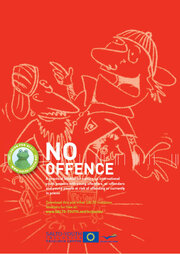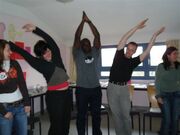Conflict Management
Going abroad with our target group is quite a challenge, that's clear by now. Motivating them, involving them in an active way are 'only' the first steps. The 'real thing', an international project, is the highlight of the process for these young people. However, even though the preparation phase was intense and prepared the young person on different facets of his life, this is no guarantee for a project without any conflict.
Handling disagreements, expressing frustration, dealing with confusion, lacking basic resources, ... are in general not easy to deal with, and specially when lacking skills and competences to manage these situations and feelings, is very hard for our target group.
Still, in any conflict, there is the potential for growth and positive change. Conflict is not necessarily destructive, if handled properly. It can become a valuable tool in building up, skills and personal strengths: when acknowledged and explored in a safe environment, it can provide powerful situations and reactions, to refer to and follow-up after the project. Viewed in this light, the conflict and the way it is managed can be seen as an opportunity to deal with self-esteem and trust.
The youth worker's role in this journey of discovery is to be open, non-judgemental, accepting and positive, and careful trustees of young people's growing vulnerability and openness. They should help the young people to recognise that confronting conflicts is a step forward in their relations to others and will give them an experience they can rely on in their daily life back home.
- Adapted from the T-kit on Social Inclusion from the chapter on "Conflict mangagement" at www.youth-partnership.net or www.salto-youth.net/TkitInclusion/
- For more information on the origin of conflicts in an intercultural situation, check the T-kit on Intercultural Learning at www.youth-partnership.net or in the SALTO Toolbox www.salto-youth.net/toolbox/
Levels of Conflict: there are different levels of conflict. Mostly when a conflict is not dealt with, it will go down the different steps like a roller coaster: incidents are numerous and tension rises.
- See illustration No Offence Booklet page 66
A lot of frustration can be avoided by bringing conflicts into the open in an early stage, in stead of letting them develop in something more serious and difficult to deal with. It is important to be able to recognise the different levels.
^^ top ^^
Some tips for managing conflicts:
- Find a situation or environment in where the young person might feel safe and can speak freely: privately, or in a group; open air or in a closed environment; ...
- Listen to the young person and don't take sides (any side)
- Encourage the young person to talk and LET him/her talk (don't overthrow the him/her with your own conflicts and experiences)
- Help the young person to explore where the roots of the conflict could be: different values, habits, norms, cultural backgrounds,...
- Try to understand how the young person feels and thinks
- Try to find out which roles or strategy both parties are using (if there are parties involved, depending on the conflict)
- Ask the young person if you could help in any way
- Help the young person to clarify the situation, perhaps the conflict is based on a (intercultural) misunderstanding: avoid judging what you don't understand and promote tolerance of ambiguity
- Don't impose your cultural norms, but try to understand the cultural rules on both sides
- Ask the young person whether s/he has an idea about how the opposite party might be feeling
- Encourage the young person to formulate possible solutions for the problem. In this way he/she will feel more involved in the solving phase and support his/her own proposals for solution.
- Encourage the young person to talk to the other party in the conflict if both are ready for this, help establishing a fearless atmosphere where open communication is possible (neutral territory, with an external mediator,...)
- ...
^^ top ^^
 www.salto-youth.net/
www.salto-youth.net/
NoOffence/

 Protected from exclusion
Protected from exclusion
Downloads
The following downloads are available:
- No Offence - projects with (ex) offenders - 2010 update
How to organise (international) youth projects with young offenders, ex-offenders and young people at risk of offending or currently in prison - despite some limitations. Based on SALTO TC No Offence 2006.
